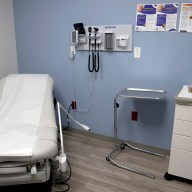 Attorney General Martha Coakley.
Attorney General Martha Coakley.
Credit: Nicolaus Czarnecki/METRO
Human trafficking can be reduced and stopped if the state worked toward bettering services including establishing safe houses, improving data collection, increasing education efforts and reducing demand, according to a report released Monday.
The report’s recommendations were announced by Attorney General Martha Coakley and other members of the Interagency Human Trafficking Policy Task Force. The report was mandated by the human trafficking law that was passed in 2011.
Coakley said the task force believed that the recommendations were “among the most comprehensive in the country.”
One of the recommendations discussed in the report was the need to establish safe houses for victims.
For Audrey Morrissey, the associate director of the service group My Life My Choice, the victim services recommended in the report would have helped her as a survivor of the commercial sex industry.
Morrissey, who said she was recruited into the sex industry at 16, didn’t get out until she was 30.
“There were no services. The only way I could cope with what was going on – the abuse and all things I was going through – was substance abuse,” she said. “I look at that and think how I could have avoided it if there were services and places to go.”
Coakley said the Internet has made human trafficking increasingly profitable and tougher to catch with victims moved around with the help of the web instead of on the street corner in view of people who may be able to help.
“I don’t think it’s diminishing. I think it’s becoming a very lucrative business,” Coakley said.
The E.V.A. Center, a Boston-based program that works with adult women involved in the sex trade, reported in 2011 that it served 225 adult women since the program began in 2006. Of that, 145 were between the ages of 17 and 25.
Other recommendations made by the task force include: developing a first-offender program option or “John school” for all sex-buying arrestees in order to address demand, piloting a data collection program to allow for sharing of information between law enforcement agencies and victim service groups and making culturally and language appropriate training to health care providers and law enforcement personnel.
Asked about how the recommendations would be paid for, Coakley pointed to creating partnerships with service organizations and not-for-profits as one way to help offset the cost.
Going forward, she said, the group will have to look at “what kind of dollars we would need.”
The report lists the recommendations for state lawmakers.
Follow Michael Naughton on Twitter @metrobosmike.
















